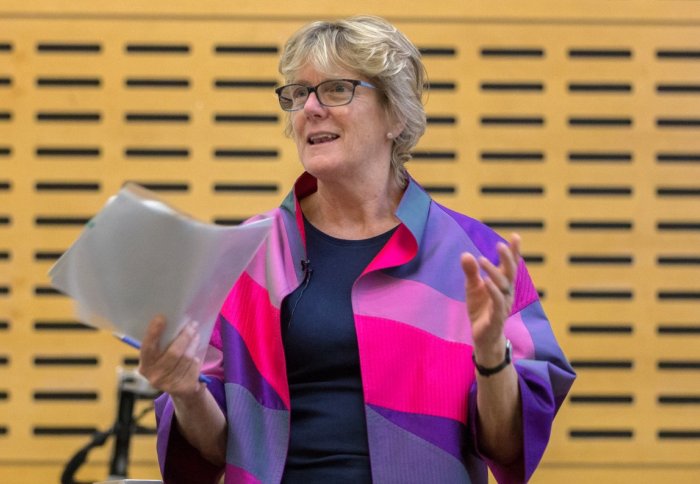Drug-resistant bugs in the crosshairs of new research initiative

Professor Dame Sally Davies, UK Chief Medical Officer
One of the world's most ambitious collaborations to tackle the rise of drug resistant infections has launched at Imperial College London today.
At the official launch of the Antimicrobial Research Collaborative (ARC), Imperial's President, Professor Alice Gast, welcomed VIPs including the UK Government's Chief Medical Officer, Professor Dame Sally Davies and Sir Richard Sykes, Chairman of the Imperial College Healthcare NHS Trust.
Professor Gast said: "At Imperial we are attacking antimicrobial resistance from all angles. By bringing together leaders in microbiology, engineering, chemistry, clinical research, epidemiology, health economics, and more, we take a holistic approach to tackling this great threat to humanity."
Imperial's interdisciplinary initiative is focused on tackling the growing challenge of infectious diseases particularly those caused by microbes that have become resistant to existing drugs. For example, in some parts of the world, doctors face strains of tuberculosis and gonorrhoea that are essentially untreatable. In the fight against malaria, experts report that there are now just one or two antimalarial drugs that remain effective. And in UK hospitals there have been isolated outbreaks of highly resistant bacteria, known as Carbapenem Resistant Enterobacteriaceae (CRE), which is a rapidly growing international threat.
Imperial is one of the world’s great universities. Working across disciplines to solve global challenges, like drug-resistant infections, is what it does best.”
– Professor Dame Sally Davies
Chief Medical Officer
Researchers, clinicians and allied healthcare professionals from Imperial’s faculties, Imperial College Healthcare NHS Trust, industrial and third party collaborators will work together to address the global threat of drug-resistant infections. They will conduct interdisciplinary research in drug-resistant infections, and translate findings into novel infection prevention strategies and therapies that can benefit patients.
Alison Holmes, Professor of Infectious Diseases at Imperial and Antimicrobial Resistance (AMR) and ARC Champion said:
"Working together as a global research community is the only way we are going to prevent a return to the pre-antibiotic era, when simple infections could be life-threatening. Also, the success of many of our medical and surgical advances is completely dependent on ensuring that patients are protected from the risk of infection. These could grind to a halt if we can't control disease-causing microbes. Our efforts are needed, not only in drug development, but to find alternatives to antibiotics and ways to use them better. We must also develop better preventive strategies; faster and more accurate diagnostics; and improved surveillance and infection control."
Global challenge
At the launch event, delegates had the chance to network with representatives from Imperial working in the field of infection research and to find out more about public engagement around the global challenge of drug-resistant infections. They also had the opportunity to participate in discussions on the world-leading interdisciplinary research that comes under the ARC banner, from molecular biology through to the use of health data in creating policy around AMR.
For example, Professor Chris Toumazou spoke about potential applications of electronic technology that is inspired by biology, to deal with the problem of AMR. Professor Toumazou is known for technologies such as cochlear implants for born-deaf children, and an artificial pancreas for type 1 diabetics, and delegates heard how he plans to turn his engineering approach to the threat of drug-resistant microbes.
Professor Dame Sally Davies chaired the final panel session of the event on ARC and the global challenge of drug-resistant infections.
Chief Medical Officer Professor Dame Sally Davies said:
“Drug-resistant infections are one of the great health challenges of our time. We need the best and brightest minds from all academic disciplines and all sectors to contribute to the fight. That’s why it’s so exciting to see ARC@Imperial bring together outstanding experts from science, engineering, medicine and business to collaborate and find new solutions. ARC’s research findings could help to limit the impact of drug-resistant infections on patients and populations in the UK, and around the world. Imperial is one of the world’s great universities. Working across disciplines to solve global challenges, like drug-resistant infections, is what it does best.”
Six recipients from Imperial’s School of Public Health, Department of Medicine and Life Sciences were awarded ARC Early Career Research Fellowships. These are one year funding awards for early career postdoctoral researchers who are working in the field of antimicrobial research.
Dr Martin Cole, Imperial alumnus and former Director Research Programmes, GSK (Pharma), presented the fellowships to Dr Gabriel Birgand, Dr Enrique Castro-Sanchez, Dr Myrsini Kaforou, Dr Johanna Rhodes, Dr Simren Gill and Dr Martina Valentini at the event.
Further information on ARC can be found on the ARC pages.
Article text (excluding photos or graphics) © Imperial College London.
Photos and graphics subject to third party copyright used with permission or © Imperial College London.
Reporter
Maxine Myers
Communications Division
Nancy W Mendoza
Communications and Public Affairs
Andrew Scheuber
Communications Division